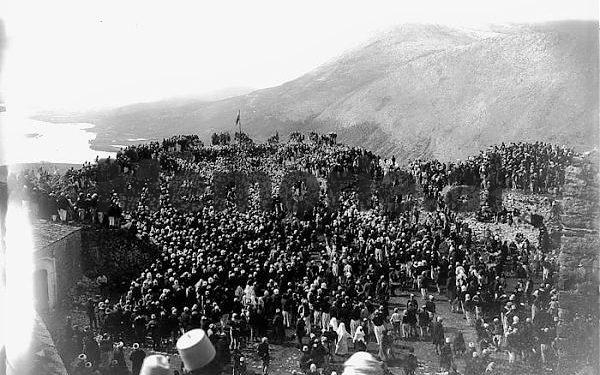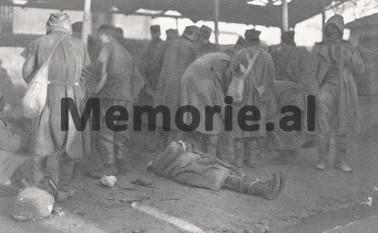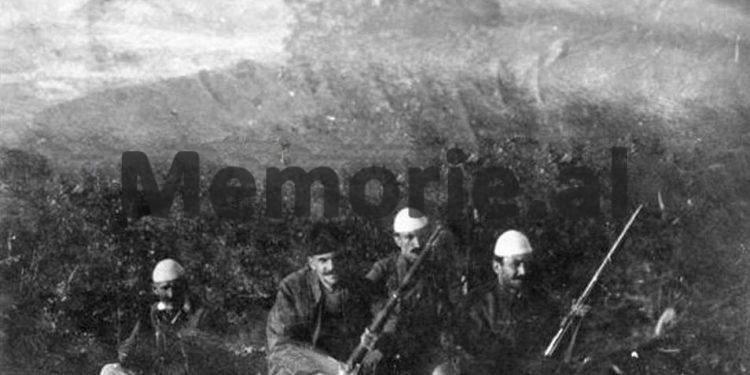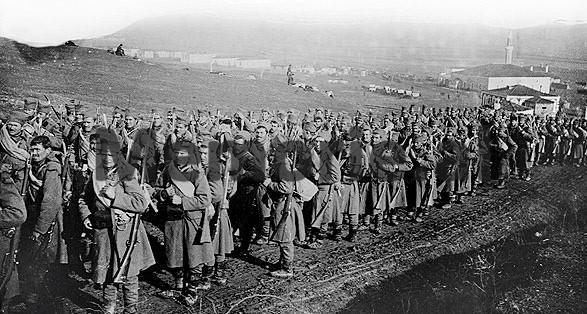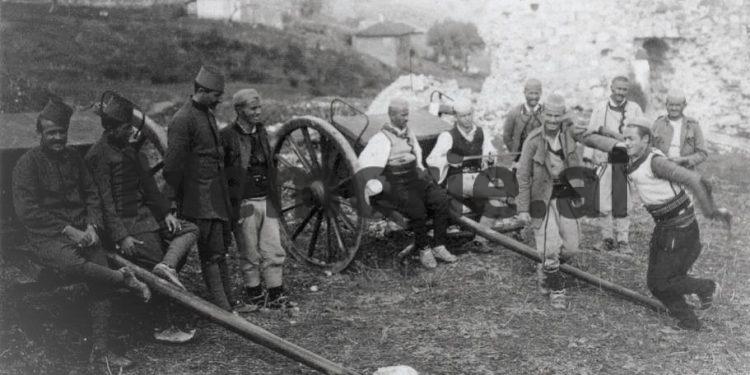Dashnor Kaloçi
Memorie.al publishes the unknown story of the researcher of the history archives, the Italian, Eugeni Buçioli, who a few years ago, published the album illustrated with photographs, entitled: “Albania, the forgotten front of the Great War”, where The preface of this album was made by the well-known researcher of the University of Venice, Francesco Leoncini, and in its 153 pages, the history of Albania and its role in the vortex of the First World War are reflected. Most of the album is occupied by photos published for the first time, which were taken from the archives of Vienna, Prague, Cambridge University, as well as from many private archives of well-known authors. The first chapter of the album, the author Buçioli, has started with a saying of the famous writer, Ismail Kadare, which is taken from his book “Rain Drums”, where it is said: “I think that Allah must have been very angry, when he created that place”!
The history of the Albanian people, focused from the most ancient times to the present day, has constantly aroused and continues to arouse the interest of many foreign albanologists, scholars, historians and publicists, who have occasionally published voluminous books with a valuable study, truly reflecting the past of the Albanian nation and the role it has played in the Balkan and European developments, both politically and historically. One of the latest publications of foreign scholars for Albania, is the illustrated album, which is entitled “Albania fronte dimenticato grande guerra”, (Albania the forgotten front of the Great War), by the Italian author, Eugenio Buçioli, who has shortly seen the light of publication.
This album is a luxury edition of the “History in the new dimension” edition and consists of six chapters (together with the various photos, which occupy the main part of the album, amount to 153 pages), for which an extensive bibliography has been used, both in the written material and in the photographic one. The Vienna Archives (Dr. Wladimir Aichelburg) of Prague (Ladislav Hofbauer) of the Cambridge University of Journalism (Storia del mondo moderno. Vol. XII), as well as some private archives, were used for the collection of the album photos. si ai i dr. Maurizio Lucheschi, Luigi Princivalli, Domenico Serafin etc. The preface to this album was written by renowned researcher Francesco Leoncini, who is currently a lecturer at the University of Venice.
Albania in the First World War
The six chapters that make up this illustrated album, which have been prepared under the auspices of Mariano Rossi, mainly provide an overview of the events that took place in Albania in the First World War and the role it played, being an integral part of the skier where that war took place. The first chapter of the album, the author Buçioli, has started with a saying of the famous writer, Ismail Kadare, which is taken from his book “Rain Drums”, where it is said: “I think that Allah must have been very angry when he created that place”.
Then, in that chapter, among other things, some data on the origin of Albanians are given. Regarding this, among other things, the author Buçioli wrote: “Albanians are called by this name in their home” and then he echoes the wars of the National Hero, Gjergj Kastrioti Skënderbeu, saying that he fought for 24 years at the head of the Albanians, against 200 thousand Turkish troops of the same sultan. In the second chapter of the album, the author dwells extensively on giving abundant information on the Berlin Congress and the Balkan wars and the agreements that were made at that time between Russia, Turkey, Austria and other European countries. Among other things, in that chapter the author states: “In search of the origin of the Albanian national spirit, the first attitudes or performances are achieved in the Russo-Turkish war of 1877 and the division of the Berlin Congress a year later”.
Presenting the consequences that came after the Berlin Congress, the author states that Albania remained a Turkish province, not without suffering its territorial fragmentation in favor of Serbia, Montenegro and Greece, which took or annexed a part of Epirus, which was autochthonous Albanian territory. There, the author stops at the League of Prizren, which was held in 1878, saying: “There it was decided to defend with weapons the territorial integrity violated in Berlin and after this decision, the Albanian insurgents replaced the Ottoman forces, which withdrew from the subjugated territories. “Against the Albanian volunteers of the North, Turkey sent 30 thousand troops to break the League of Prizren and after this expedition, the leaders of the League were killed or exiled and the prince with great weight and influence among the Albanians, Preng Bibë Doda, was taken hostage.” .
After this analysis, the author reflects on subsequent events, stating: “After five years of the Albanian League of Prizren, the tribes of Hoti, Kastrati and Shkreli, gathered in a new League, in order to reclaim the Albanian territories which were handed over to Montenegro. Albanian nationalist manifestations also took place against the background of the Russo-Turkish war of 1897 and the Young Turk revolution of 1908. Fortunately for the Albanians, the division or fragmentation of their territories was against the interests of Austria-Hungary, both determined to resolve Albania’s independence, against the annexationist plans of neighboring countries, which for a long time had exercised their influence in this country.
Italy, through trade exchanges and Austria-Hungary, supporting with great funding the presence of the Catholic Church, especially in the provinces of Northern Albania “.
Then, in that chapter, we talk about the beginning of the Balkan wars and the intentions of our neighbors such as Greece, Montenegro, Serbia and Bulgaria, as well as the attitudes held at that time by the various Balkan states. It also provides an overview of the events that took place in Albania after the declaration of independence and the arrival of Prince Vid, as well as the political developments that took place during that time.
The tragedy of the Serbs in Albania
In the third chapter of the album, the author has dedicated a main place, what happened to the Serbs, when they were defeated by the Austrians and in an attempt to escape them, crossed the Albanian mountains (Northern Alps) to reach the Adriatic coast. Regarding the war of the Austrians with the Serbs, among other things, the author Buçioli states: “The withdrawal of Serbs through Albania is considered one of the most tragic events of the ‘Great War’. Attacked in early October 1915, in the North by the Austro-Germans and in the East by the Bulgarians, who wanted to prevent unification with the Franco-British, stationed in the Vardar valley, the Serbs were forced to retreat to the West, supported by Montenegrins.
In front of the Serbs marched the Austro-Hungarians captured in the first phase of the war, where, according to Italian sources, there were about 70 thousand people, who exposed to the severity of the cold season, malnourished and stricken with typhus, during on the way to retreat they fell into the lap of death and only 27 thousand completed their very arduous ordeal in the territory of Albania. Along with them was the Czech officer, Rudolf Prohaska, who in his memoirs published in 1928 in Prague, wrote, among other things: “During that grueling journey from ice, frost and hunger, we marched tired through it. forest surprises. In order to defeat hunger, we were forced to exchange body clothes and blankets that we had with us, with the food we received in Albanian villages, such as lamb or potatoes.
In his memoirs about the Albanians, Prohaska states, among other things: “They were endowed with an indomitable instinct for freedom, but deprived of a sense of discipline, in bloody and constant rebellions with their own authorities, unprepared for any spark of state acceptance and divided into eternally rival clans (tribes). They preferred to get along with the Hungarian captives, rather than with the Serbs, who viewed them hostilely. Not everyone resisted the hardships on the snowy paths of the Highlands. Whoever fell exhausted died without any possibility of help. “Finally, the Serbs threw into the Drin River everything that prevented them from walking: trucks, cannons, and even King Peter’s car.”
Evaluations of foreign scholars and politicians, for the album
“Albania has an indisputable right among the peoples of the Balkans”
The fourth chapter of the album reflects Albania of the period 1913-1918, occupied by foreign powers and references are taken from the book “History of the Austro-Hungarian administration in Albania (1916-1918)”, by German author Helmut Schwanke. Among other things, in that chapter the author states: “Having become independent a year before the outbreak of the ‘Great War’, Albania returned to be during the conflict, as it had been for centuries, occupied in two thirds of Austro “The Hungarians and the rest of the Italians and the French.”
Also, in that chapter are given the assessments of many foreign politicians, who have been reflected in various publications, such as the one in “Les peuples libres” (Lossana April 1918), where it is said: “It seems that a fact has been won today in history and this is that the Albanian nation has woken up and should know at the price of the greatest sacrifices to take back the country, for which it has an indisputable right among the peoples of the Balkan Peninsula ”.
In the sixth part, which is the last chapter, testimonies of triestine soldiers from the Serbo-Albanian front (as territory) are given, reflecting them with authentic facsimiles of letters and postcards sent by their families). In addition to the rich historical source material, which has been taken from the richest European archives, what made this album more interesting, are the many published photos, which are a living proof of the history of the Albanian people who speak more than anything else.
Who is Eugenio Buçioli, author of several albums for history!
Eugenio Buçioli, who is also the author of the album “Albania the forgotten front of the ‘Great War”, was born in Piavone Diaderso, Italy, in 1930 and lived for a long time in the Austrian capital, Vienna. Buçioli is a researcher and cultivator of historical research, very well-known not only in the Apennine area, but also in Europe. He worked for a long time near the historical archives of Italy, Austria, Hungary, etc., where he collected data and news on his Italian compatriots, who were forcibly recruited in the Imperial (Imperial) army of Austria-Hungary, elaborated them in a narrative form and then published them in seven story books.
Among others, the researcher of historical archives, Eugenio Buçioli, has published the albums “Venice in Austro-Hungarian objectives”, “Face to face Italian and Hungarian photos”, “From Moldova to Piave”, “Czechoslovak legions of the great war” etc. The preface to the album, written by renowned University of Venice scholar Francesco Leoncini, provides an overview of Albania, which was part of World War I, in its geostrategic position between the Baltic and the Adriatic Aegean.
Among other things, in that preface, the author states: “Albania has been and is part of Central Europe based on this fact, its works, and in particular those that have been constructed in this volume (album) with an abundance of photographic documentation, are reconsidered precisely under this new dimension that unites the North and the South of what can be called the third Europe”. Memorie.al




